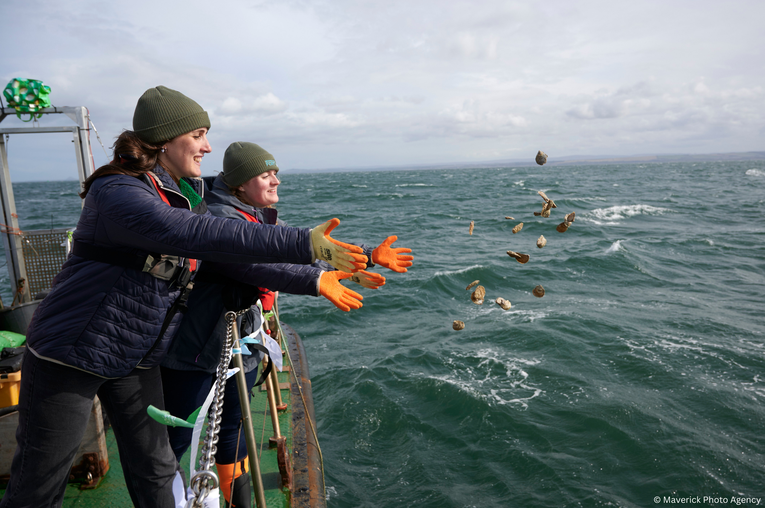
Utilise COP28 to change the narrative of nature destruction into one of protection
Global governments, environmental charities and interested parties are convening in Dubai, UAE, to take part in COP28, the UN’s annual climate conference.
The conference will focus on the threat we face from a rapidly changing climate, but we cannot forget the impact that climate change has on biodiversity. While Earth’s temperatures naturally ebb and flow, damaging human activities are causing global temperatures to exceed historical records. Rising temperatures are further exacerbating the burdens placed on the environment, which is already under incredible strain.
We encourage all those attending to use their platform to push for strong, ambitious and co-ordinated climate commitments that tackle the threat we all face from worsening global warming, head-on.
Our ask of the UK Government
We urge the UK Government and COP28 negotiators to champion our ocean by encouraging all parties to protect, restore and invest in our ocean to the same level as global terrestrial environments.
Our three action pillars
We know that our ocean is incredible. It is home to an amazing range of biodiversity, from great whales to microscopic plankton, and there is still more to discover. Our ocean also provides crucial benefits that mitigate climate impacts through blue carbon habitats like seagrass and saltmarsh, flood defence systems, and acting as a heat sink. The ocean also has great potential for supporting renewable energy.
During COP28, we are hoping to hear announcements and see action plans dedicated to furthering protection, restoration and increased investment in our ocean.
Protection
The UK hosts amazing wildlife that many wouldn’t think could be found in our waters. Fin whales, orca, turtles and coral species are all known to frequent UK seas, in addition to many more beautiful creatures and marine plants.

Credit: Desi Drew/Shutterstock
The UK is also responsible for 14 Overseas Territories (UKOTs) which are home to pockets of immense marine biodiversity and some species that are unique to these locations – making up an estimated 90% of biodiversity for which the UK Government is responsible for. We need a suite of protective measures to be implemented so that amazing marine wildlife can survive and thrive far into the future. These include:
- At least 10% of UK waters being offered the strictest possible environmental management.
- Banning harmful chemicals where there are clear alternatives.
- Shifting to a circular economy and introducing a comprehensive deposit return scheme (DRS).
Jean-Luc Solandt, our Principal Specialist in MPAs, says: "We need to see exclusion of bottom trawling in Marine Protected Areas designated for seabed habitat protection and processes.
We know that more complex ecosystems support more life, absorb more carbon, create more habitat for fish, clean seawater of pollutants, and support richer and more varied life, making the seas more resilient - in turn - to things like climate change impacts, and invasive species.
Jean-Luc Solandt, Principal Specialist MPAs
Restoration
Unfortunately, vast areas of the marine environment are damaged, and ecosystems changed from their natural state. Restoring these environments and helping them recover can help to increase biodiversity and reverse destruction caused.

Credit: Maverick Photo Agency
We are currently working on projects that aim to do just that – we are proud founding partners with The Glenmorangie Company and Heriot-Watt University of the Dornoch Environmental Enhancement Project (DEEP). This visionary project started in 2014 and has resulted in 85,000 native oysters being returned to the Dornoch Firth in northeast Scotland, helping the local ecosystem as a result.
As a keystone species, oysters are fundamental to creating diverse and healthy ecosystems. Oysters also help to filter the surrounding water – an ocean-based solution to improve water clarity and, in some cases, water quality. We are also delighted to be a part of the WWF-led Restoration Forth project, where just this year, working with Heriot-Watt University, we helped return 3,000 native oysters to the Firth of Forth, after a century's absence. Restoration of marine environments can also be achieved by:
- Creating sustainable fisheries that set catch limits based on scientific evidence and avoid sensitive and important areas, such as fragile habitats, blue carbon stores and nursery areas, allowing for the restoration of the marine environment.
- Implementing marine planning that prioritises restoring and improving the marine environment for current and future generations.
Investment
Although we derive so many crucial benefits from our ocean, it remains dangerously underfunded. We must direct more investment towards the marine environment so that we can ensure the continuation of species and of livelihoods, and to reduce damaging climate impacts. This is achievable by:
- Developing a sustainable blue economy to increase investment into our ocean.
- UK Government including the marine environment and blue carbon habitats in UK carbon budgeting and Nationally Determined Contribution to the Paris Climate Agreement.
- Continued support for important international conservation efforts such as the Blue Belt programme.

Credit: Heather Hamilton
A healthy ocean benefits every part of society and so should be a top priority for us all. The Marine Conservation Society is supporting the Ocean Breakthroughs which outline 5 key ocean-based climate actions that benefit people and nature. The breakthroughs demonstrate the various ways we can accelerate implementation of ocean-based solutions and take strides towards a healthier, cleaner and better-protected ocean.
We are passionate about doing everything we can to achieve a healthier, cleaner and better-protected ocean. Will you support us on this journey by making a donation or becoming a member today? Your support will be vital to our efforts to clean up our seas from devastating pollution, protect marine life and combat the climate and nature crisis.





